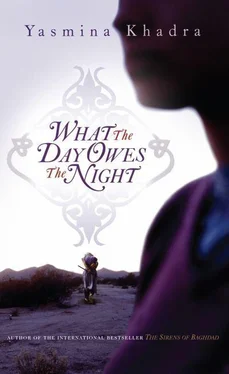After that first attempt, we didn’t kiss, but we saw each other almost every day and dreamed up fantastical plans.
Then suddenly, abruptly, our ‘engagement’ came to an end. It was a Sunday morning. I had been skulking around the house – my uncle had shut himself in his room and Germaine had gone to church – half-heartedly trying to play or read. It was a glorious spring day; the swallows had come early, and Río Salado was scented with jasmine.
I went for a walk, my head in the clouds, and though I had not planned to do so, I found myself standing outside the Rucillios’ house. I called to Isabelle through the window. She did not come down to the door, but peered at me through the shutters for a moment before slamming them open and screaming:
‘Liar!’
From her tone and the incandescent fury of her stare, I knew she hated me – it was the tone, the look that she invariably used when she had decided to declare war. I had no idea of the charges levelled against me; I was completely unprepared for the attack. I stood there speechless.
‘I never want to see you again, Jonas!’ she declared, and I realised this was the first time I had ever heard her address anyone without using monsieur or madame.
‘Why did you lie to me?’ she screamed, infuriated that I simply stood there looking confused. ‘Why?’
‘I’ve never lied to you . . .’
‘Haven’t you? Your name is Younes, isn’t it? You-nes? So why do you go round calling yourself Jonas?’
‘Everyone calls me Jonas . . . What difference does it make?’
‘It makes all the difference!’ she shouted breathlessly, her face flushed as she spat scornfully. ‘It changes everything.’
‘We are from different worlds, Monsieur Younes,’ she said implacably when she had got her breath back. ‘And the fact that you have blue eyes is not enough.’ Then, before slamming the shutters closed, she spluttered contemptuously: ‘I am a Rucillio, or had you forgotten? You surely don’t think I could marry an Arab? I’d rather die!’
As a child, such a glimpse into the adult world can scar you for life. I was shell-shocked; I felt as though I had woken from a nightmare. I would never again look at things the same way. There are things that, though to a child’s eye they seem so trivial as to be inconsequential, come back to haunt you; even when you close your eyes, you feel them drag you down, tenacious and cruel as the pangs of remorse.
Isabelle had ripped me from my safe little world and tossed me into the gutter. Adam cast out of Eden could not have felt more wretched, and the lump in my throat was harder to swallow than his apple.
After what Isabelle said, I began to be more circumspect, more attentive. I noticed that no one in Río Salado wore a billowing haik, and that the dishevelled wretches in turbans who haunted the vineyards from dawn to dusk did not dare come into Río Salado itself, and that my uncle – whom most of the villagers assumed was a Turk from Tlemcen – was the only Arab to have succeeded in putting down roots in this fiercely colonial village.
What Isabelle had said had shocked me.
After that, whenever we met, she would stalk past, head high as a butcher’s hook, as though I had never existed. Nor did it stop there: she invariably imposed her prejudices on others. If she had decided to hate someone, she insisted all her friends do so too. I watched as a yawning gap opened up around me in the school playground, my classmates deliberately shunned me.
It was for Isabelle’s sake, too, that Jean-Christophe Lamy picked a fight with me at school and beat me to a bloody pulp. Though he was a year my senior, Jean-Christophe had little to boast about, since his father was the son of a caretaker. But Jean-Christophe was hopelessly in love with Pépé Rucillio’s indomitable niece, and he hoped by beating me up to show her how much he loved her, how far he was prepared to go.
Shocked by the sight of my injuries, the teacher called me up before the whole class and demanded that I name the ‘little savage’ who had done this. When I refused, the teacher ordered me to hold out my hands and thrashed me with a ruler, then made me stand in the corner for the rest of the day. After class, he had me stay behind, thinking he could coerce me into giving him the name of the culprit. Still I refused, and eventually he let me go.
When she saw the state of me, Germaine was livid. She demanded to know who had done this to me, but again I stubbornly refused to answer. She insisted on taking me back to the school so she could find out what had happened, but my uncle, who was slumped in a corner, dissuaded her. ‘You’re not taking him anywhere,’ he said. ‘It’s high time he learned to stand on his own two feet.’
Some days later, as I was wandering through the vineyards, I saw Jean-Christophe Lamy and his two henchmen, Simon Benyamin and Fabrice Scamaroni, coming across the fields towards me. Though their manner was not hostile, I was terrified. They did not usually play around here; they hung around the town square or played football together on a patch of waste ground. The very fact that they were in my neighbourhood was not good news. I didn’t really know Fabrice. He was in the class above me: I often saw him reading comics in the playground. He seemed an unremarkable boy whose only talent was his ability to give Jean-Christophe an alibi when he needed it, but I suspected that he might wade into the fight if things turned nasty. Not that Jean-Christophe needed any help; he knew how to throw a punch. Simon was a different matter. I did not trust him at all – he was wildly unpredictable, capable of head-butting a friend just to put an end to a boring conversation. He was in the same year as me, and was the class clown. He always sat at the back and constantly persecuted the clever students. He was a dunce who would complain when the teacher gave him a bad grade, and he hated girls – especially the pretty, clever ones. Simon and I had met on my first day at the school. He and his gang had crowded around me and jeered at me, at the scabs on my knees, at my delicate features, ‘like a little girl’, at my new shoes, which they said made me look like a frog. When I did not react, Simon called me a sissy. After that, he ignored me.
Jean-Christophe was carrying something under his arm. I watched carefully, waiting for him to signal to his friends. Strangely, I saw no sign of the malicious grin, the tenseness in his movements he usually exhibited when about to beat somebody up.
‘We’re not here to hurt you,’ Fabrice said.
Jean-Christophe approached me warily, looking embarrassed, even apologetic. His shoulders sagged under the weight of some invisible burden.
He held out a package.
‘I came to say sorry,’ he said.
I did not take the package, suspecting some practical joke, so he placed it in my hands.
‘It’s a wooden horse. It means a lot to me, but I’d like you to have it. Take it, please, and forgive me.’
Fabrice stared at me, willing me to forgive him.
Once he felt that I had a grip on the package, Jean-Christophe took his hands away and whispered: ‘And thanks for not telling on me.’
In that moment, the friendship between the four of us, one that was to prove among the most important in my life, was sealed. Later, I discovered that Isabelle, furious at Jean-Christophe’s hapless attempt to impress her, had insisted he apologise to me in the presence of witnesses.
Our first summer in Río Salado began inauspiciously. On 3 July, Algeria was rocked by Operation Catapult, in which a British naval squadron bombed the French fleet at the Battle of Mers-el-Kébir. Three days later, before we had had time to weigh the extent of the disaster, His Majesty’s Air Force returned to finish the job.
Читать дальше












